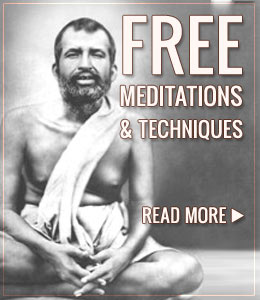BEFORE YOU BEGIN: If you are seeing a therapist, or are taking any form of medication, check with your therapist or doctor first before beginning any meditation practice.
There are some important points to keep in mind as you begin your meditation practice:
- Discipline: We need to make the effort. A burning enthusiasm and a sincere yearning will bring results.
- The Proper Time and Place: Choose a time and a place for meditation where you will not be distracted or interrupted. Mornings are best, or after work before supper. Unplug the phone. Give yourself permission to take this time for yourself.
- Be Regular with your Practice: To begin, try to meditate 15-20 minutes daily. In time, you may want to extent this period.
- Make sure that your stomach is relatively empty: Do not meditate on a full stomach. When we meditate we can interfere with the process of digestion. Besides, meditating on a full stomach can make one sleepy. It is recommended that you wait 3 hours after a heavy meal before beginning your meditation practice.
- Proper Posture: Meditations can be done sitting in a straight-backed chair, or on a cushion on the floor. Your back should be erect, but not strained. Your back should be away from the back of the chair or the wall. Your chest, neck and head need to be in a straight line. Your hands can be resting on your thighs, either palms downward for grounding, or palms upward in a gesture of receptivity.
- Don’t strain: Don’t strain in your practice. Your body is upright, but relaxed. Like a properly tuned violin string, your mind is not too loose, not too tight. Be focussed and alert. Be relaxed.
- Keep your eyes closed: However, if you feel that your posture has shifted, open your eyes slightly, adjust your posture, re-orient yourself, then close your eyes again and return your attention to your meditation.
- Introspection: Meditation helps us to get to know ourselves. This is not as simple as it seems. We need to make an honest inquiry into our own inner nature. Self-study gives us the perception and wisdom we need to make adjustments to our character, our actions and our attitudes, where necessary.
- The right attitude: Have the right attitude towards your meditations. Feel good will towards yourself and for your practice.
- Mindfulness: Remain alert, attentive and aware in your practice.
- Concentration: Maintain a steady mind. Keep focused. When the mind wanders, gently bring it back to your practice. STEADY CONCENTRATION LEADS TO TRUE MEDITATION
- Witness: Be a witness to your practice. Observe your thoughts and emotions as if they are not your own; observe them as if you are watching a parade, without attachment.
- Surrender: With surrender, we can let go of our ego’s involvement in the process.
- Be Receptive: When we are receptive to the possibilities, we are open to grace.
- Be Patient: Don’t rush the practice. With regular practice, positive results are sure to come.
- Be Present: Don’t let past memories or concerns for the future monopolize your awareness.
- Smile: As you begin your meditations, smile. Smiling can dissolve our inner shadows, and allow the light of Spirit to shine.
- Have Faith: Have Faith that the practice of meditation will be beneficial, and it will happen.
- Devotion: Open your heart with devotion and feel a compassionate interconnection with all beings.
- Re-integration: At the end of each meditation, always re-integrate your meditative awareness, your awareness of spirit, with your mind, your emotions, and your body. Feel your connection with the ground beneath you. And sit quietly for several minutes before getting up to end your meditation session.
Taken from the “Getting Started PDF“.


